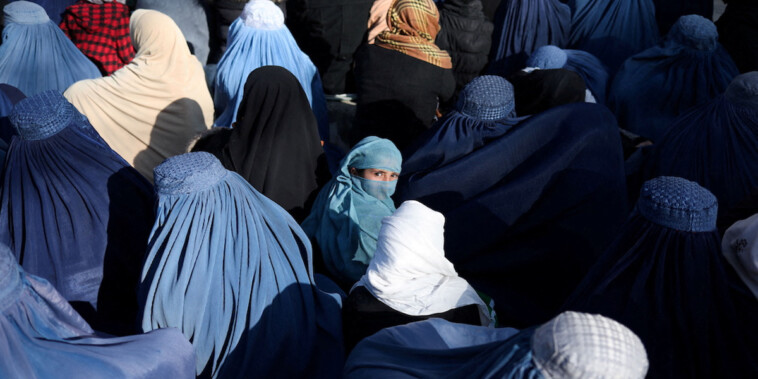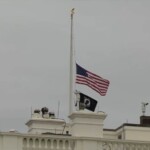
While liberals in the US protest in favor of Hamas, the Taliban is waging a war on women’s rights.
The Taliban in Afghanistan have intensified their oppression of women by imposing new laws that further restrict their rights and freedoms.
Women are now banned from speaking in public, reciting the Quran publicly, or looking at men outside their families.
These measures also mandate women to conceal their faces and voices outside their homes, extending the authoritarian control the Taliban reestablished after their return to power in 2021.
These laws deepen the exclusion of women and girls from public life, exacerbating the isolation and despair faced by Afghan women, particularly in urban areas where enforcement was previously less stringent.
The Taliban’s Ministry for the Prevention of Vice and Propagation of Virtue enforces these rules with broad powers, punishing individuals without due process.
Public spaces are patrolled by morality police who crack down on dress-code violations and other perceived transgressions, creating a pervasive climate of fear.
Activists argue that the regime uses religion as a tool to justify these draconian measures, leveraging such restrictions to consolidate power and potentially gain leverage in negotiations for international recognition and economic aid.
The Taliban’s continued crackdown on women in Afghanistan has led to widespread arbitrary arrests, ill-treatment, and violence linked to violations of its strict dress code.
Women accused of wearing a “bad hijab” have been detained in public spaces, often held in overcrowded conditions and subjected to intimidation.
The Taliban’s policies, which make male relatives responsible for enforcing the dress code, institutionalize gender discrimination and further restrict women’s roles in society.
Since retaking power in 2021, the Taliban has systematically dismantled hard-fought gains in gender equality, symbolized by the replacement of the Ministry of Women’s Affairs with the Ministry for Propagation of Virtue.
Under the Taliban regime, women have been systematically excluded from nearly all aspects of public and private life.
They have been banned from education, employment, and public spaces, with girls prohibited from attending school beyond sixth grade and women barred from universities.
Female-run businesses, such as beauty salons, have been forcibly shut down, and secondary schools have reopened only for boys. Women’s sports, activism, and participation in protests are met with intimidation, violence, and outright prohibition.
Public appearances are tightly controlled, with women required to wear full-body coverings and banned from raising their voices in public. The Taliban’s morality police enforce these measures with sweeping powers, often detaining and punishing women arbitrarily.
Women have been excluded from parks, gyms, and historic sites, and they must have a male guardian to travel.
They are also excluded from NGOs and international organizations, with some agencies being forced to remove the word “woman” from their names. In the media, strict rules ban women from participating in broadcasts or being featured in content.
The return of the Taliban and their enforcement of strict Sharia law have resulted in a dramatic rollback of women’s rights in Afghanistan, effectively ending progress toward gender equality.
Women have protested these injustices, demanding their rights to work and education, but their efforts have been met with violence, arrests, and bans on unauthorized demonstrations.
The Taliban’s institutionalized discrimination has created a system of gender apartheid, accompanied by a rise in forced and child marriages. Acts of domestic and gender-based violence have also increased, with women frequently denied access to justice.
Afghanistan faces a dire humanitarian crisis, with nearly 24 million people in need of assistance due to conflict, poverty, and natural disasters.
The situation has been further exacerbated by the collapse of essential services, deepening the plight of women and girls.
The United Nations has launched a $3.06 billion response plan, prioritizing food security, healthcare, and protection for vulnerable groups, including women and children.
Despite global condemnation—including criticism from the United Nations, rights groups, and countries like Germany—the Taliban remains steadfast in its oppressive policies.
Amnesty International has identified the Taliban’s human rights violations as constituting gender persecution, a crime against humanity, and continues to advocate for international pressure through sanctions and travel bans.
Informal diplomatic ties with nations such as China, Russia, and the UAE complicate global efforts to hold the regime accountable.
Afghan women’s rights activists continue to speak out, but many feel abandoned by the international community as the bleak outlook for Afghan women and girls persists under the Taliban’s oppressive rule.
And this is the wonderful system that many liberals in the U.S. are defending.



